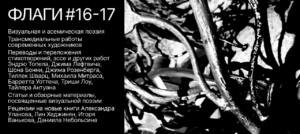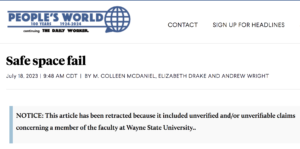And loveliness?
Death has an understanding of it
Loyal to many flags
And is a silent ally of any country
Beset in its mortal heart
With immortal poetry.
—Laura Riding, “The Poet’s Corner
From Moscow, under conditions of global duress, comes the online publication of Flagii (Flags), double issue, numbers 16/17. Clicking on this link gets the issue, and for those without Russian, using Google translate or its equivalent yields a sense of the incredible poetic activity going on right now, with an intent to find “allies of any country.” Also breaching the gap are a number of texts with visual properties, in a selection introduced by Vladimir Feshchenko with work by Jackson Mac Low, Bernadette Mayer, Larry Eigner, Robert Grenier, Hannah Weiner, Rachel Blau du Plessis, Susan Howe, and myself (“Introduction to the Letter T”). I am also represented by an interview with Vladimir Koshelev and a translation of a section of Under Erasure by Lisa Kheresh, linked here, as well as the note on a little-known collage by Sylvia Plath that I wrote about on this site in 2010 (here), with commentary in Russian (here). It is not only a real honor to be included in this work but an example of what we should be doing now, connecting across the greatest distances possible, aspiring toward the horizon of “this time we are both.” … More















